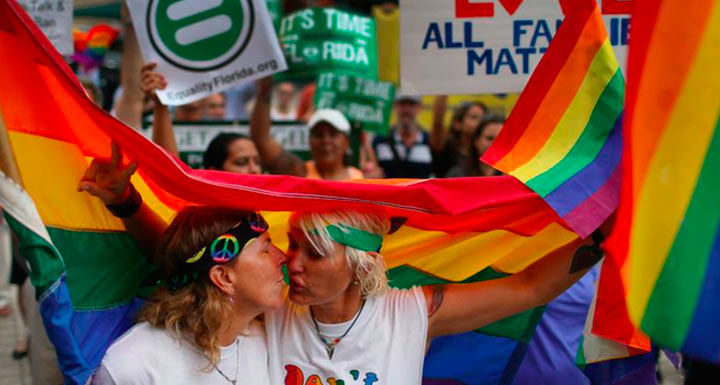
Florida appeals court hands marriage equality case to state Supreme Court
In a 10-3 ruling Wednesday, Florida’s 2nd District Court of Appeal said the issue of whether the state’s 2008 ban on marriage for same-sex couples is unconstitutional should be decided by the state’s Supreme Court — not them.
In the court’s majority opinion, the judges said the issues require immediate resolution by the Florida Supreme Court because such a determination is of “great public importance and will have a great effect on the proper administration of justice throughout the state” and acknowledging that regardless of what they themselves might decide, the issue will likely be addressed by the higher court anyway.
“In any event, because of the constitutional implications the issue will likely be addressed by the Florida Supreme Court regardless of any decision we might make,” the judges wrote in the opinion.
The ruling is the latest result of a divorce case involving a same-sex couple, Mariama Monique Changamire Shaw and Keiba Lynn Shaw, who married in Massachusetts in 2010 and have since relocated to Florida. The couple filed for divorce in the state earlier this year. Their case was dismissed by a circuit court judge who said that the court had no jurisdiction over their marriage because it is not recognized under Florida law. A panel of judges of the 2nd District Court of Appeal initially denied a request to pass the case to the state Supreme Court, but Wednesday’s ruling of the full court overturns the earlier decision.
The judges also take into account a string of recent rulings across the state that have found the 2008 voter-approved ban on marriage for same-sex couples unconstitutional, including in a federal court just last week, in its reasoning for suggesting immediate resolution is needed by the highest court in the state.
“Resolution of the constitutional questions will no doubt impact far more individuals than the two involved here,” the judges wrote. “And there can be little doubt that until the constitutional questions are finally resolved by the Florida Supreme Court or the United States Supreme Court, there will be a great impact on the proper administration of justice in Florida. Similarly, in light of those questions, it seems clear that this is a matter of great public importance.”
Three judges dissented in the ruling, and argued the appeals court could rule on the issues presented in the case on its own and that ultimately it doesn’t address the issue of whether the ban is unconstitutional or that same-sex couples should have the right to legally marry.
“It is important to understand that the issue in this case is not whether Florida is constitutionally compelled to marry same-sex couples,” Judge Chris Altenbernd wrote in his dissent. “Even if the United States Supreme Court ultimately holds that Florida can reserve the rights and privileges of civil marriage in Florida to heterosexual couples, many other states have already legalized such same-sex marriages. Although the parties argued broader issues to the circuit court, the narrow, dispositive issue in this case is whether Florida, under the Full Faith and Credit Clause of the U.S. Constitution, must give credit to these lawful out-of-state marriages for the purpose of dissolution.”
On the specific issue of dissolving the same-sex couple’s marriage performed in Massachusetts, Altenbernd said, “I am confident that this court can ably consider this appeal and reach a proper resolution. Our decision will resolve the issue for all trial courts in Florida unless another district court disagrees with us.”
Florida Attorney General Pam Bondi, who has defended the state’s ban in recent cases, is reviewing the Wednesday decision, the Associated Press reported. In separate cases before the state’s 3rd District Court of Appeal, Bondi asked judges Aug. 7 to hold off on ruling on the matter until the United States Supreme Court makes a national ruling on marriage for same-sex couples.
A message was left with Bondi’s office seeking additional comment.

